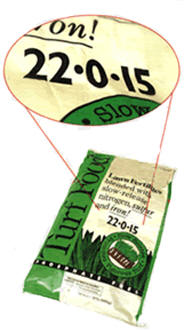|
|
 |
 |
| |
| A
statewide Minnesota law,
prohibiting the use of
phosphorous lawn fertilizers,
went into effect January 1,
2005. Minnesota law bans the use
of phosphorus fertilizer,
because phosphorous is the
nutrient that turns Minnesota's
lakes and streams green with
algae. |
| |
 |
 |
When shopping for your
lawn and landscaping
supplies, purchase
fertilizers that contain
zero phosphorous, and
only buy brands that
have clearly indicated a
middle number of zero
(X-O-X) on the
packaging. This simple
action will help protect
Minnesota's lakes and
streams from increasing
algae blooms, excessive
weed growth and
deteriorating water
quality. |
|
| |
|
The
Minnesota Lakes
Association, a
statewide nonprofit dedicated to
the protection and preservation
of Minnesota's lakes, reminds
Minnesota citizens that aside
from using phosphorous-free lawn
fertilizers homeowners can take
a variety of additional
measures, in order to reduce the
storm water runoff reaching
Minnesota's lakes and streams.
If we all do our part Minnesota
lakes and streams will have
cleaner and clearer waters this
summer! |
| |
|
1-Lawn Clippings.
Rake and sweep all lawn
clippings, leaves and other yard
debris into an enclosed yard
compost bin or dispose of them
at city composting piles. These
are all sources of phosphorous
and can quickly make their way
to nearby water bodies if left
in yards, on curbs, or in
ditches. |
| |
|
2-Pet Waste.
Pick up and properly dispose of
all pet waste, because this can
be a harmful source of bacteria
in lakes and streams. |
| |
|
3-Exposed Soil.
Cover or protect any exposed
soil in your yard, because
spring rains quickly wash away
any loose soil, resulting in
cloudy sediment-filled waters. |
|
|
|
|
|
|
|
|
|
|
|
|

